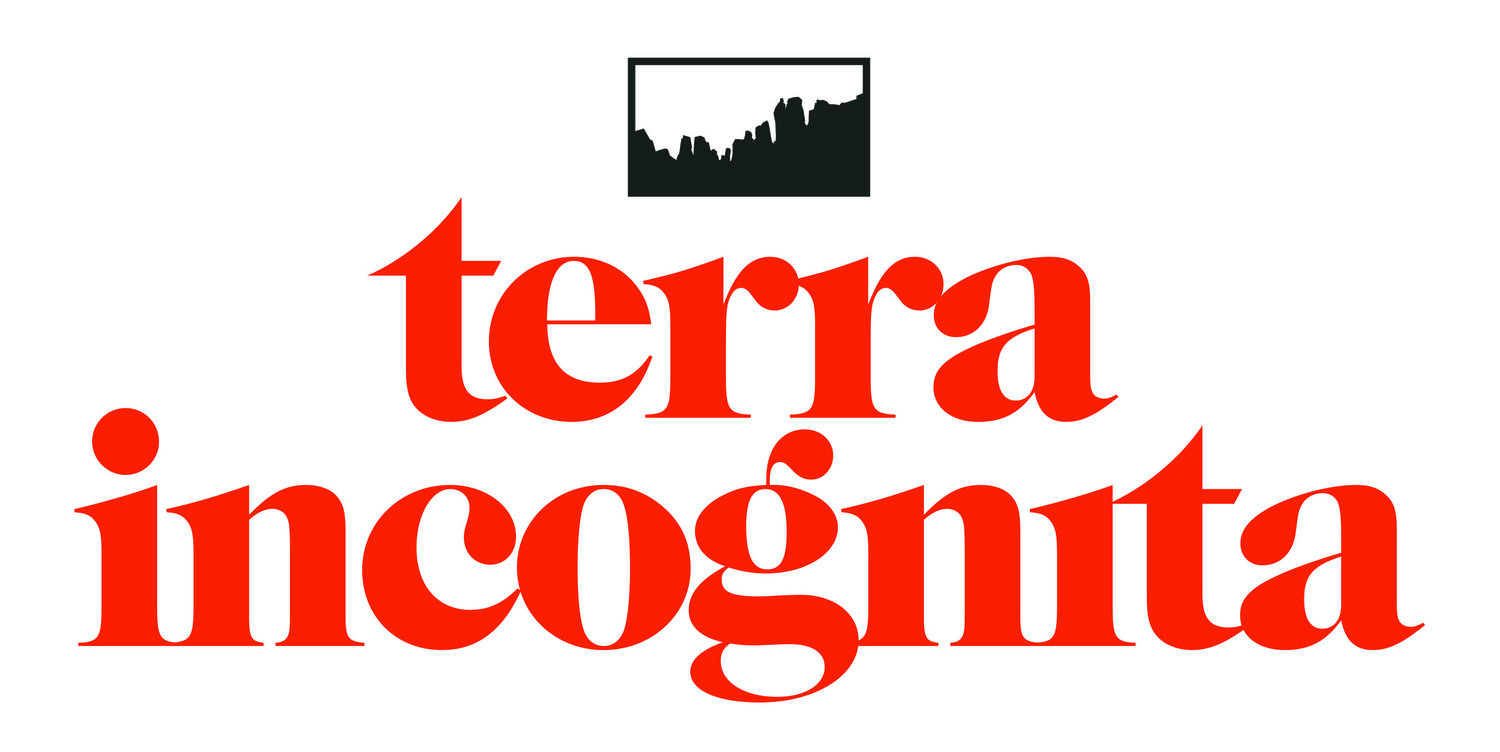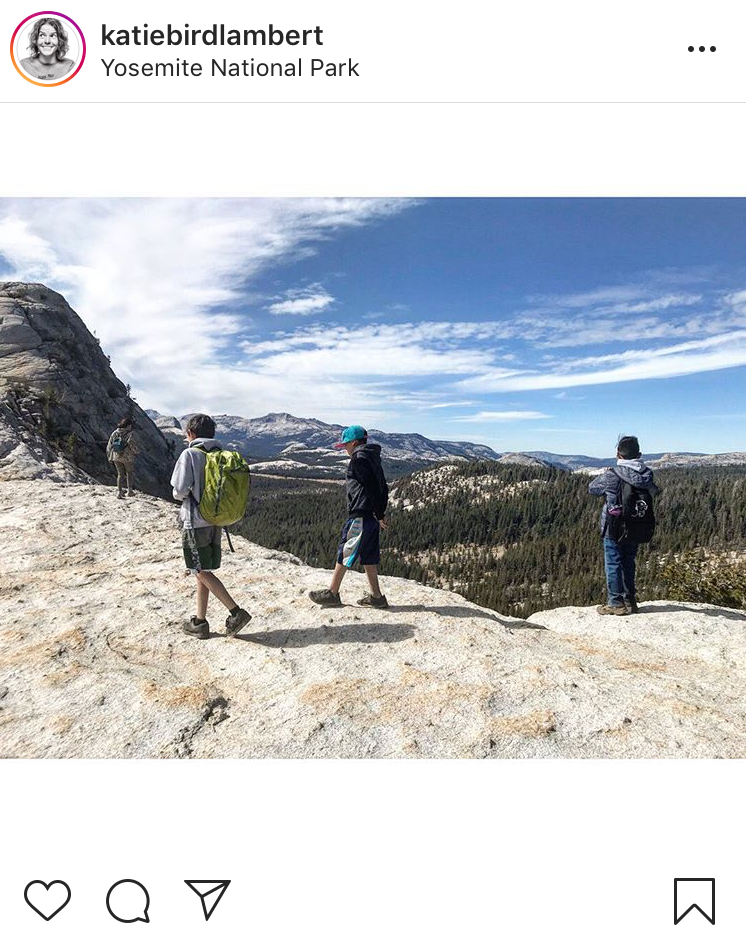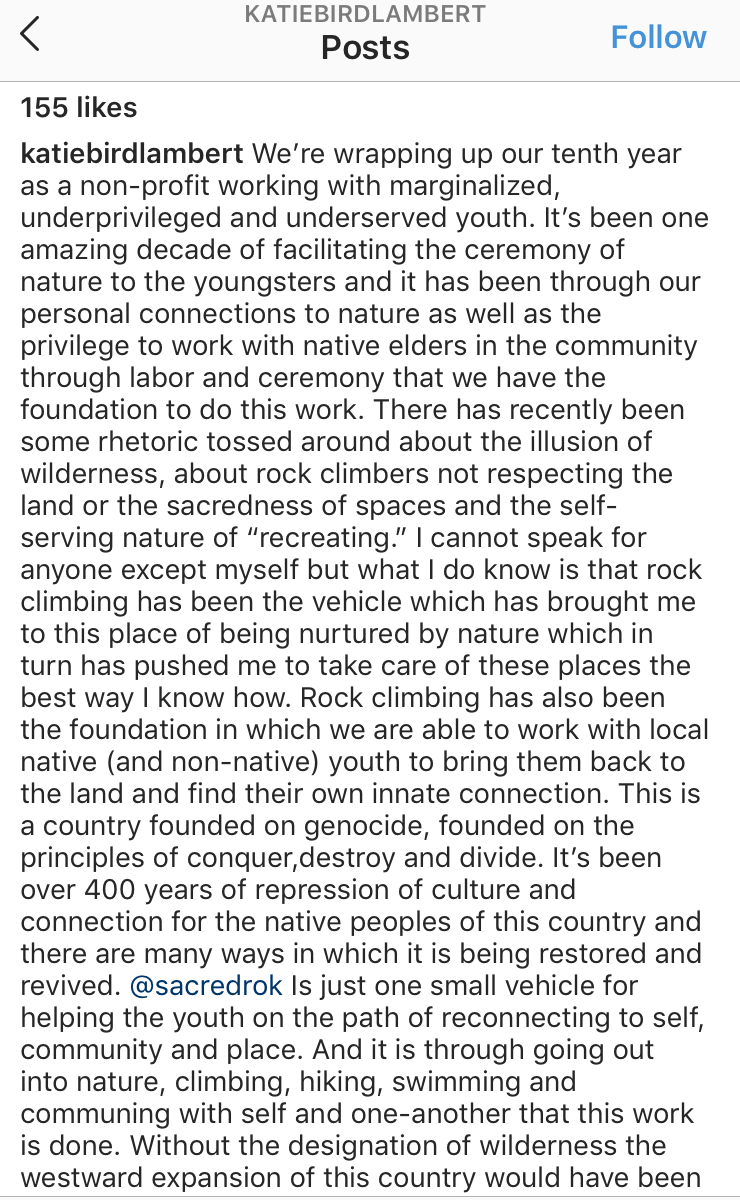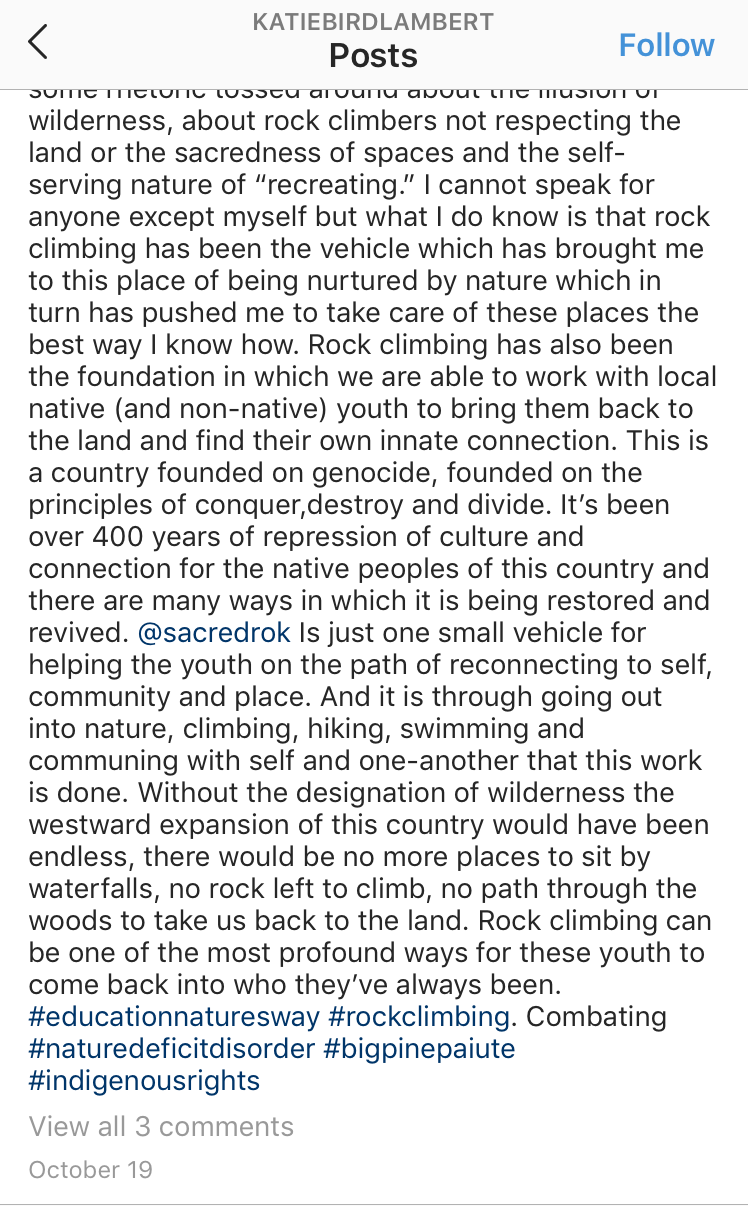“Pretty Good”: The American Alpine Club’s Continued Exclusion, Exploitation, and Tokenization of Black and Indigenous Communities and How White People Rationalize It Away
The American Alpine Club’s Craggin’ Classics Have a History of Being Exclusive, Exploitative, and Tokenizing of Black and Indigenous Organizations, but Chris Schulte Reports Back That They Are Doing “Pretty Good.”
White people have historically anointed themselves as the “keepers of nature” from John Muir to Theodore Roosevelt to Madison Grant – all of these men declared protection for sacred lands without consent or engagement with Indigenous peoples and then used enslaved, Black people to work the land and build the society we see today. In the name of “conservation,” we have reservations, ghettos, redlining, poverty, and food deserts. Now, we see outdoor companies and organizations rallying around protecting “public lands” and protesting Trump and climate change deniers, yet there is a severe lack of acknowledgment and accountability for the continued genocide and erasure of the original stewards of the land, the Indigenous communities who are directly impacted by recreation, tourism, and specifically, the influx of the climbers in places like Payahüünadü, so-called Bishop, CA.
Today, those who anoint themselves as the keepers of nature hide their entitlement behind working with nonprofits for underserved youth, yet completely disrespect or ignore the Indigenous leaders of that same community in which they say they are helping to “restore” and “revive.”
For example, Katie Lambert a climber, writer, and guide based in Payahüünadü wrote this caption on her Instagram:
At face-value, this post could read as humble, sweet, and heartwarming. But let’s look deeper. The problem is that Lambert is at once denying the invasive and destructive impact that rock climbers have on stolen land, and then goes on to describe how this country was founded on genocide. White climbers and institutions tend to interpret reality in very ahistorical terms.
When I first got into climbing you could say I had rose-colored glasses on, but as I grew older I realized “rose-colored glasses” is just code for white privilege. It’s hard to look at something critically when you directly benefit from it. We are fish in the water of white supremacy. You have to be willing to grapple with the cognitive dissonance that occurs when you realize that what you love is a product of an oppressive plan.
Climbing is at once a product of ongoing oppression, as well as a tool for various people of various backgrounds to heal and connect with the outer and natural world. But as white people we have to watch what we call “healing” when we actively contribute to oppressive circumstances through buying land, participating in gentrification, cultural appropriation, and more. We are complicit in so much ongoing intergenerational trauma. We have to be accountable for our positions in society that impact our relationship to climbing, and we need to take seriously how we have access to land that is not ours. We need to adopt a heightened sense of responsibility, one that requires an examination of our access, our privilege, and our role in ongoing colonization.
We need to examine and account for how we ourselves are products of white supremacy and how we benefit because of this.
Lambert, as a climber and white woman, in the same paragraph denies her position and active role in these oppressive structures and yet goes on to acknowledge genocide that she benefits from. It’s a paradox that is only possible through white saviorism. And this is exactly the kind of thing white people in positions of power and leadership need to be working on within ourselves. Racism is not always explicit or overt. We are all conditioned to be racist in ways we don’t recognize. As white people we are indoctrinated into this white supremacist country and are conditioned to believe that we have the answers and that we are the best people to help no matter the situation. We need to pause and think, “Maybe we are the problem?”
Lambert goes on to say, “Without the designation of wilderness the westward expansion of this country would have been endless, there would be no more places to sit by waterfalls, no rock left to climb, no path through the woods to take us back to the land.”
This is false. The national parks and “wilderness” were born out of genocide, and the removal of indigenous peoples from their homelands. The creation of the national parks and “wilderness” are a manifestation of westward expansion and “manifest destiny.” These “wild spaces,” or “public lands,” are part of the fabric that makes up white supremacy. Lambert applauds the construction of wilderness, a figment of the colonizer’s imagination that tangibly bars indigenous peoples from their life source, and gives us, white people, exclusive access to what we call our “playgrounds.”
National parks and public lands only exist due to the historical violations and abuses of Indigenous peoples’ rights.
Good, well-meaning, white, liberals who are at the forefront of organizations like The American Alpine Club, The Outdoor Alliance, The Access Fund, The Sierra Club, etc. are all too often erasing, dismissing, and foregoing acknowledgment of the dispossession and resettlement of Indigenous communities. There are countless examples of these organizations inviting Black and Indigenous folx to their events and exploiting their presence and knowledge just so they can appear “diverse,” and “inclusive.” But as Rachel Cargle, a public academic, writer, and lecturer wrote, “Unless the racism is addressed and eradicated in the places you are looking to make ‘diverse’ you are simply bringing people of color into violent and unsafe spaces.”
White-dominated climbing organizations have a god complex -- “an unshakable belief characterized by consistently inflated feelings of personal ability, privilege, or infallibility.” Groups like The American Alpine Club and the Access Fund feel entitled to outdoor spaces, as well as their comfort. They have a track record of going quiet whenever they are confronted about the harm that they have caused. When they are called to account for harmful behavior or language they sweep it under the rug, wait for things to die down, and never acknowledge what the impacted groups are saying. They position themselves as gatekeepers and perpetuate a culture of exclusion.
Even when they make attempts to be “inclusive” and “diverse,” they end up causing harm because they are not looking at themselves, the culture, and how they operate.
At the most recent Craggin’ Classic in Payahüünadü (so-called Bishop, CA), Indigenous Women Hike, Legendary Skies Enterprises, and Climb the Gap were invited to the yearly event by The American Alpine Club with the expectation that each organization would be participating in some kind of panel discussion to speak about their org’s work and mission. But in the days following the event, Climb the Gap and Indigenous Women Hike reported on their Instagram stories that they felt disrespected, exploited, and tokenized.
Jolie Varela, a citizen of the Nüümü and Yokut nations, started Indigenous Women Hike after spending three months at Oceti Sakowin standing with her relatives against the Dakota Access Pipeline. Each water protector who went to Standing Rock was encouraged to keep the sacred fire burning in their own communities. IWH is Varela’s manifestation of just that. The last two summers Varela facilitated a group of Indigenous women on a journey to reclaim the Nüümü Poyo, The People’s Trail, which many know as the John Muir Trail. Varela has been an active voice in Payahüünadü advocating for indigenous rights and healing. She has started a movement that has brought to light John Muir’s racism and anti-indigenous legacy, as well as created a gear library in her community to provide equipment and education to low-income families. Recently, Varela was able to garner support from her Instagram followers to provide warm clothing and firewood for Indigenous families in her area.
When Varela read Chris Schulte’s review of this year’s Craggin’ Classic on Black Diamond’s Instagram account, in which he says they did, “pretty good,” and that they, as in climbers, are “keeping up with growth, and bringing more people into climbing than ever, and with a set of goals, values, and ethics key to the upkeep, expansion, and diverse growth of our climbing culture and history,” she reported that she couldn’t keep quiet any longer.
Schulte’s summary is very self-congratulatory — a weak attempt at humility.
In response, Jolie Varela wrote,
“...as far as I know myself and my crew were the only Natives from here that attended. So who did they [Schulte] reach out to and learn from? Because we had a group of about 20 in our group and he wasn’t one of them. The AAC is not doing ‘pretty good.’ They’re actually doing worse than previous years and his post is glorifying the atrocious job they did. Our voices were erased and our time was wasted on Friday night. I’ve been asking this org to do better for three Craggin’ Classic events now, and they cannot get it together. You cannot use us as props to make it seem like you care about Indigenous presence and community being involved when you don’t show up or give us the platform to speak.”
Jolie Varela and Kris Hohag, Nüümü, a recording artist, entrepreneur, and educator of Legendary Skies Enterprises — which provides jobs through local indigenous cultural eco-tourism, as well as land and water restoration work, while offering specialized trainings and career development opportunities to staff and partners — hosted a cultural walk on Sunday, the last day of the Craggin’ Classic. No one from the AAC showed up.
On the Monday following the Craggin’ Classic, Climb the Gap — a collective that supports current and future climbers of color, based in Los Angeles/land of the Tongva people — informed their community about what happened during their trip to Payahüünadü by writing this message on their Instagram story:
“Disappointed in @americanalpine for inviting us to travel to Payahuunadu/Bishop for the Craggin’ Classic, only to have our time disrespected, not given a platform to speak about what we do, and be tokenized as a way to fulfill a DEI objective.
Also, frustrated to witness the same happen to @indigenouswomenhike @payhuunadu and to know that this event is just a drop in the bucket of injustice and erasure.
This was a missed opportunity to educate hundreds of climbers and outdoor industry reps on what climbers need to do to respect and care for the land and the people that inhabit it, as well as uplift the voices of those that are not so privileged to seek access to the outdoors.
Also fitting that we, as four BIPOCs, would experience major side-eye and unwelcoming looks out at the crags and in town. If @AmericanAlpine is truly committed to diversity, equity, and inclusion, it needs to do better.”
In order for the outdoor industry to stop making the same mistakes of the past, white-dominated organizations and white individuals who participate in them must hold themselves accountable for this egregious behavior and harm.
Whiteness continues to be centered and upheld over and over again, and we white people need to take a look in the mirror and start uprooting our internalized white supremacy. We are all born into a white supremacist society, which means we are conditioned to believe in the foundational lies that are incubated by our society. A huge barrier for white people accounting for the harm we cause is due to our investment in the belief that we are inherently “good.” We believe that as individuals and as a society we are all inherently benevolent and innocent, but this is the biggest lie of all. Professor Eddie Glaude breaks down this myth eloquently in this three-minute clip:
"It’s easy for us to place it all on Donald Trump’s shoulders... This is us. And if we’re going to get past this we can’t blame it on him. He's a manifestation of the ugliness that’s in us." @esglaude says white people must reckon with the continued presence of racism in the U.S. pic.twitter.com/dclEaLsrK9
— MSNBC (@MSNBC) August 6, 2019
He says, “America’s not unique in its sins. As a country, we’re not unique in our evils. I think where we may be singular is our refusal to acknowledge them. And the legends and myths we tell about our inherent goodness, to hide and cover and conceal so that we can maintain a kind of willful ignorance that protects our innocence.”
All white people need to make conscious efforts to unlearn our internalized white supremacy, rather than believing ourselves to be exempt just because we are liberal, progressive, “outdoorsy,” and work for nonprofits. Racism has historically been embedded in the psyche of the outdoor industry. By excluding Indigenous experiences and foregoing acknowledgment of who the land truly belongs to, environmental institutions have successfully, whether they realize it or not, invisibilized Indigenous communities in the outdoor industry and any space that dictates how we come to understand the environment in the United States.
Racialized constructions of Indigenous communities as people of the past have always shaped the way the outdoor industry, recreationists, and environmentalists approach natural spaces. The exclusion of their experiences to this day means that we now have an industry flooded with colonial-settler narratives voiced by white, Western Europeans. Chris Schulte’s post in which he uses words like “growth,” “expansion,” and “occupy,” as well as his bio where he implies that he goes on “vision quests,” are prime examples of this.
These narratives promote appropriation, exploration, and discovery, which are attitudes that have led to the mass murder and rape of countless Indigenous women. Dominant mainstream culture has played a significant role in the myth-making of “public lands.” There is the false belief that this country’s soil is rightfully and publically of the people.
But “the people” that the constitution and forefathers were considering at the time were not Black or Brown. Julie Cruikshank in her book, The Social Life of Stories: Narrative and Knowledge in the Yukon Territory, has noted that the stories we tell about ourselves, others, and the places we live manifest through social, historical, and political processes. It is time to complexify the narratives and it is time to actively de-center whiteness in the outdoors.
The disturbing “side-eye” that Climb the Gap experienced when out at the crag while visiting Payahüünadü, and the recurring erasure that Varela endures at the hands of the outdoor industry, is not a singular experience. It is the duty of all white people, especially white-dominated organizations like The American Alpine Club, to amplify and highlight Black and Brown communities who are doing the real work of creating inclusive and equitable spaces, and not only that, but pay them for their efforts, emotionally, physically, spiritually, and intellectually. The AAC and it’s advocates, like Chris Schulte and Katie Lambert -- highly influential people in the outdoor industry -- need to address the harm they cause and co-sign — the harm that all white people, myself included, perpetuate if we are not actively practicing anti-racism and detaching from our commitment to whiteness.
It’s a choice to actively work against systems of oppression, as well as incorporate anti-racism into the inner workings of our lives and organizations that we participate in. The AAC needs to stop their programming and address their white supremacist culture, or they will only continue their cycle of abuse.
Recommended Resources:
Organizations:
AORTA: Anti-Oppression Resource and Training Alliance
Books:
An Indigenous Peoples’ History of the United States of America by Roxanne Dunbar-Ortiz
Dispossessing the Wilderness by Mark David Spence
Black Faces, White Spaces by Carolyn Finney
The Fire Next Time by James Baldwin
Women, Race, and Class by Angela Davis
The History of White People by Nell Irvin Painter
Between the World and Me by Ta-Nehisi Coates
Articles:
The Case for Reparations by Ta-Nehisi Coates
Climbing Everest Isn’t a Bucket List Dream — It’s a Crisis of Overtourism by Bani Amor
Check Yourself Before You Wreck Someplace Else: A Guide to Responsible Summer Travel by Bani Amor
Connecting Appalachia to the World Beyond by bell hooks
How to Deal with Racism in the Outdoors by Leah Keinama Hasse
White Supremacy Culture by Tema Okun
Podcasts:
This Land by Crooked Media
All My Relations by Matika Wilbur and Adrienne Keene
1619 by the New York Times
Seeing White by Scene on Radio
Men by Scene on Radio










